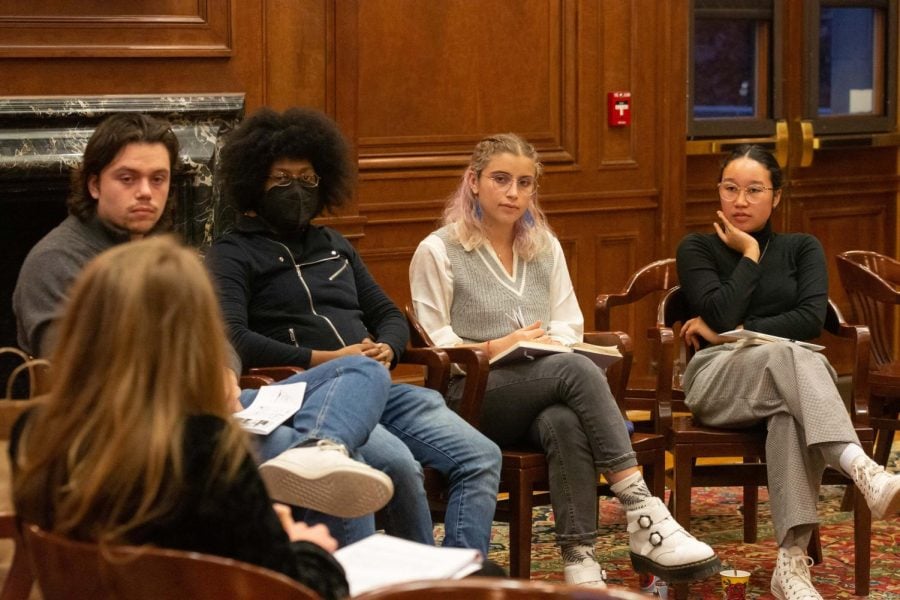Northwestern, UChicago students and community representatives discuss city-campus relationships
Zhizhong Xu/The Daily Northwestern
Students speak at the Monday panel about campus and city relationships at their respective universities.
November 15, 2022
Content warning: This article contains mention of gun violence.
Digital magazine publication Public Books hosted community representatives the Rev. Julian DeShazier and Patrick Keenan-Devlin (Bienen ’06) for a discussion of city and campus relationships at Harris Hall on Monday.
The event also brought together Northwestern and University of Chicago students to share insights on the relationships between their respective universities and communities.
DeShazier is the senior pastor at University Church Chicago, while Keenan-Devlin is a youth defense attorney and executive director of the James B. Moran Center for Youth Advocacy in Evanston.
Keenan-Devlin discussed a moment of revelation during his career, when he connected with one of his young clients who lived near Hecky’s Barbecue, just a half-mile from NU’s campus.
The young client did not know where the University was, according to Keenan-Devlin. Despite attending Northwestern as an undergraduate, Keenan-Devlin only realized the disconnect between the campus and the local community when he encountered this client. He said he thinks none of the clients that he has represented in his decade-long career have had any relationship with the University.
DeShazier grew up in Washington Park, the neighborhood adjoining Hyde Park and UChicago on the city’s south side.
“There was always this sense of … both resentment and aspiration,” DeShazier said of the neighborhoods surrounding UChicago. “People who I now interface with on a regular basis don’t call themselves ‘South Siders.’ They call themselves ‘Hyde Parkers.’”
Though University Church Chicago neighbors UChicago and shares a similar name, it is not affiliated with the university. The reason for the separation — resulting from an agreement between the university’s first President William Rainey Harper and theologian Herbert Lockwood Willett — was to allow the church to hold the university accountable.
Keenan-Devlin said the town-gown relationship between NU and Evanston has shifted in the past decade. The University has made efforts to further racial equity initiatives in Evanston, he said, including the introduction of the Racial Equity and Community Partnership grants program. The Moran Center for Youth Advocacy received a grant from the program in 2021.
“If you told me 10 years ago that Northwestern was going to invest a million dollars, not in a fire truck but in community-based organizations like mine, I would have laughed,” Keenan-Devlin said.
Evanston was built around NU, Keenan-Devlin said, and the nature of this relationship means Evanston is dependent on decisions made by the university. Because Evanston’s politics are intrinsically influenced by the University, NU should be responsible for reparations and divestment, he said.
Public Books Assistant Editor Ruby Ray Daily (Weinberg Ph.D. ’21) said both NU and UChicago’s websites use language like “maximizing economic opportunities for the community” when they discuss their respective town-gown relationships.
DeShazier said this language neglects to mention the community engagement that universities should be prioritizing.
“That, to me, does not represent an act of love or care,” DeShazier said.
Sophie Plotkin, a recent UChicago graduate, recalled Chicago’s last primary mayoral election. Students showed overwhelming support for Lori Lightfoot, who graduated from UChicago’s law school in 1989. The general student population, Plotkin said, voted against the sentiments of the neighboring communities, which opted for Toni Preckwinkle or Amara Enyia.
Plotkin also discussed UChicago’s relationship with both campus and city police. Following several shootings on or near campus in 2021, the university’s police department committed to an increased collaboration with Chicago police in November 2021. Plotkin said a vocal group of students called for more security, even proposing a wall around the university campus.
UCPD is one of the largest private police forces in the country. As a fully certified law enforcement agency, UCPD is allowed to expand its jurisdiction to nearby areas. UChicago community members and Chicago residents have criticized UCPD’s impact on the South Side.
Plotkin was a member of #CareNotCops, a UChicago campaign that began in response to the police shooting of student Charles Soji Thomas. During summer 2020, CareNotCops occupied the street outside the Provost’s house weekly. Every night, the police would shine lights on protesters and tear down encampments, Plotkin said.
Plotkin criticized UChicago’s community relations board for the university’s indifference toward #CareNotCops.
“The university never once acknowledged any of this happened,” Plotkin said.
Weinberg senior and panelist Dori-Taylor Carter described the student community as a “bubble,” especially after the COVID-19 pandemic displaced students from the city for an extended period of time. Carter said campus dining and dorm residency requirements are other hindrances to student connection with the surrounding neighborhood.
When panelist Jack Jordan (Weinberg ’22) worked as an NU admissions officer last year, he said he frequently received questions about the University’s safety. Unfortunately, a way to handle these questions was to distance the school from Chicago and Rogers Park, Jordan said.
“Whether you want to be in the bubble or you don’t, it is a physical thing,” Jordan said. “It’s gonna pull you in regardless.”
Email: zhizhongxu2026@u.northwestern.edu
Twitter: @zhizhong_xu
Related Stories:
— Mayor Daniel Biss talks town-gown relations at Northwestern, UChicago event
— Daniel Biss discusses policing, racial equity and town-gown relations in Northwestern forum



